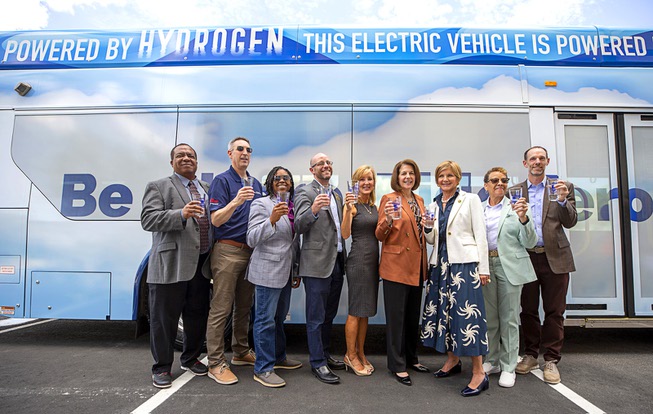
Politicians, members of the Regional Transportation Commission of Southern Nevada, and invited guests toast with glasses containing water from a hydrogen fuel cell electric bus at the Harry Reid Technology Park Thursday, Aug. 17, 2023. The bus does not emit pollutants or green house gasses, only water or water vapor. M.J. Maynard, CEO of the RTC, is at center.
Friday, Aug. 18, 2023 | 2 a.m.
Transportation officials celebrated Southern Nevada’s first hydrogen-powered buses by toasting with glasses of water — the engines’ only emission — from the vehicles’ tailpipes.
The two buses, built by New Flyer, are equipped with tanks of hydrogen and an electric fuel cell. The cell generates power through a reaction between the hydrogen and oxygen that produces water vapor as its only byproduct.
Regional Transportation Commission CEO M.J. Maynard said the vehicles were the first of 16 the commission plans to purchase by 2025 with the help of $18 million in federal funding. The first two buses were largely funded via a $3.8 million Low or No Emission Grant from the Department of Transportation that covered 95% of the cost of equipment, infrastructure and training for the new technology, officials said.
“The grant funding is there, so the goal is to ensure that our entire fleet is either electric or hydrogen,” Maynard said. “The biggest challenge right now is … getting the buses, because everybody wants to do it.”
Maynard said the commission started investigating the switch to hydrogen fuel cell buses about three years ago and planned to replace all of its roughly 400 large buses with either electric or hydrogen buses by 2050.
One hydrogen-powered bus costs about $1.2 million; electric buses cost about $1 million, she said.
“Buying the bus is the easy part. It’s really looking for those federal grant opportunities for the needed infrastructure,” she said.
Paul Soubry, CEO of New Flyer, said the fuel cell and its cooling system add less weight to a bus’ structure than electric batteries do. The buses can be refueled with hydrogen in about seven minutes, he said.
Hydrogen fuel is much more efficient than gasoline, but it’s also roughly four times more expensive, according to the website calmatters.org.
Sen. Catherine Cortez Masto, D-Nev., said the buses were a natural fit for Southern Nevada’s environment and economy.
“These buses can be easier to maintain, they’re quieter, and they make our air easier to breathe,” Cortez Masto said Thursday at an event unveiling the new buses. “And not to mention, they help us address what we know is happening in front of us every single day: the climate crisis.”
Rep. Susie Lee, D-Nev., said low-income communities disproportionately bear the brunt of climate change and the resulting poor air quality.
“That’s why this technology is so important, to make sure the 61,000 Clark County residents who use our public transportation can get to where they need to go in a much cleaner way,” she said at the same event.

